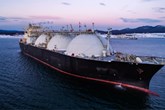Renault Group joins UECC environmental initiative
Published by Jessica Casey,
Editor
LNG Industry,
Renault Group has signed up to participate in United European Car Carriers’ (UECC) Sail for Change (S4C) fuel-switching programme, making it the fifth automotive manufacturer to join the pioneering initiative that has seen major reductions in emissions through bunkering of bio-LNG on UECC vessels.
Pilot shipments of Renault vehicles started on 1 July 2025 from Zeebrugge, Belgium, to Esbjerg, Denmark, under S4C, which UECC estimates will result in an annual saving of 1 million kg (1000 t) of Scope 3 CO2 emissions for the French car maker.
“It is great to see that another valued customer has decided to come onboard Sail for Change as the programme has expanded since being launched a year ago, boosting bunkering of bio-LNG to generate significant emissions reductions to meet the market demand for more sustainable maritime logistics,” said UECC CEO, Glenn Edvardsen.
“The programme has gained momentum with the support of our customers, which enables us to step up our sustainability efforts through increased investment in alternative fuel technologies for a greener future.”
The use of high-impact bio-LNG as fuel on UECC’s fleet of dual and multi-fuel LNG pure car and truck carriers (PCTCs) enabled the company to cut its CO2 emissions by more than 107 000 t in 2024 and it expects this reduction to increase by 50% to nearly 155 000 t in 2025.
Renault Group is looking to reduce emissions from its supply chain and logistics by at least 27% by 2030 as part of its ambition to achieve net zero in Europe by 2040 and worldwide by 2050 under its ‘Renaulution’ strategic plan.
UECC’s Energy & Sustainability Manager, Daniel Gent, said: “Sail for Change is our flagship product for customers seeking to decarbonise, allowing them to make a direct, meaningful and certified impact on their supply chain emissions by offering marine transport powered by sustainable fuels, complemented by energy efficiency measures in UECC ship operations and onshore electrification.”
UECC has been able to realise major environmental efficiency gains for its fleet under S4C through the use of both biofuels and bio-LNG, which allows carbon-neutral cargo shipments, as it seeks to expand the scope of the programme to embrace more sustainable fuels such as e-LNG.
Bio-LNG, which is being provided for S4C under a supply agreement with Titan Clean Fuels, is now seen by UECC as the key fuel to achieve its target of a 45% reduction in carbon intensity by 2030 towards its goal of net zero by 2040.
“As a front-runner in decarbonisation of shipping, UECC is in alignment with the needs of the market through low-carbon ship operations and is delivering on our long-term promise to insulate our customers from regulatory penalties under the new green regime,” Gent added.
UECC has been able to avoid surcharges for its customers as its eco-friendly fleet is generating a compliance surplus under FuelEU Maritime that can be monetised through the pooling mechanism of the regulation. And this surplus is set to continue long into the future with increasing adoption of alternative fuels that are expected to account for 58% of the company’s fuel use by 2030.
Edvardsen concluded: “The success of the Sail for Change programme shows that it is hitting a sweet spot in the market amid regulatory pressure that represents a commercial driver for sustainability, proving that this is a key competitive differentiator both for UECC and its customers.”
Read the article online at: https://www.lngindustry.com/lng-shipping/18092025/renault-group-joins-uecc-environmental-initiative/
You might also like
Naftogaz receives first US LNG delivery to Ukraine
Naftogaz, in partnership with Poland’s ORLEN, has secured delivery of the first batch of American LNG to Ukraine in 2026.


